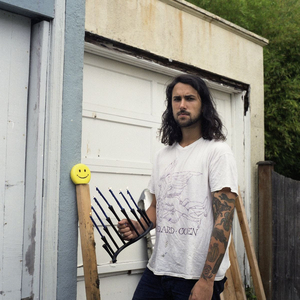
Seattle-based multi-instrumentalist and songwriter Jesse Rosenthal shared his new single "Ever Since You Left." The track is the second offering from Rosenthal's upcoming solo debut The Killing Language. Look at My Records featured the track today as a "New & Notable" pick, praising, "The track flows with a lively, bombastic energy that stems from a combination of over-the-top lyrics and Rosenthal's own knowledge of 80s pop music tropes, which he seamlessly incorporates into the song's instrumentation and structure. The big, shiny riff that arrives just before the three-minute mark and serves as the bridge to a series of more subdued ones really stands out as fitting into this mold, as it sounds like it was plucked right out of the credits of a John Hughes film."
The Killing Language features Rosenthal's sonic range and complexity, taking listeners on a journey spanning traditional genre boundaries, yet offers a consistent, underlying tone of whimsy and camp. Listen to "Mitzvah Bells" on all streaming platforms and Bandcamp now - The Killing Language is out April 2nd.
Jesse Rosenthal, the Seattle-based multi-instrumentalist and composer, makes lush, labyrinthine pop music. The songwriter and pianist in the up and coming band Advertisement, Rosenthal's work as a solo artist is thorny, complicated, and above all else, breathtaking. His first official debut record, The Killing Language, hones in on issues of masculinity and mental health by way of baroque flourishes and heady arrangements.
Listening to The Killing Language feels kind of like if Van Dyke Parks decided to write songs for Abba. Rosenthal crafts music that feels like getting used to a pool of cold water. First you experience the initial shock of arpeggiated pianos and stoic guitar riffs going in every possible direction. Then the songs warm up, they begin to feel like home, like an old house covered in chintzy wallpaper that blooms with little sonic flowers from every inch. The record was written in quarantine over the course of only three months, which he self-recorded, produced, and mixed in his own bedroom studio. Rosenthal had scrapped a full-length record that ultimately felt unfocused. During quarantine, things crystalized into focus, and The Killing Language rapidly came into existence.
On The Killing Language, Rosenthal writes songs that are whimsical and poetic. This playfulness comes directly from Rosenthal's childhood. As a kid, he was enamored by musical theater, and grew up obsessed with the high drama of Stephen Sondheim's Sweeney Todd and Into the Woods. Although he's since shifted his tastes away from the gaudiness of Broadway, that deviously entertaining trickery exists everywhere in his work. The Killing Language is very much a record laden with high camp, one that oscillates between making you laugh and cry while also sustaining your attention through nervous and beautiful production flourishes. Just take the slow burning "Chelsea," as one such offering. The song starts off proggy and dissonant and then abruptly shifts gears, transforming into something strident, full of jagged guitars that stick out like quartz in a cave. "Cue the dreams of childhood/The ones I loved, blue skies above" he sings as the song is rejiggered into a post-punk sea shanty.
On "Fireworks," the last song on the record, Rosenthal showcases his ability to write incisive lyrics. In the song, Rosenthal takes on the role of a character who is seeing their dream as a prophecy. "Every night I go down to the river/and I find fewer fish/pressure in the sky and the moon bearing down like an incoming fist," Rosenthal sings as the pink sky begins to purple and it feels like the world is going to end. "Sharing the same cerebral and madrigal-imbued qualities of Kate Bush, the track unravels alongside its narrator. "The song calls on conspiracy theory and myth and how you can project meaning on it through the specific meaning of a symbol and how the symbol can act as a signifier," says Rosenthal of the song's conceptual underpinnings. "Ideally it would bring someone to this place where they're thinking about masculinity, sanity, conspiracy and closure in our world and culture," he elaborates. For Rosenthal, writing music has in many ways saved his life. He writes music that is deeply empathetic, and is often rooted in his own experiences with his mental health. The Killing Language then is a study in compassion, on expressing yourself through the stunning complexities that only music offers, and in making something you really believe in. - Sophie Kemp
Listen here:
Photo Credit: Che Hise-Gattone
Play Broadway Games
 Test and expand your Broadway knowledge with our new game - The Broadway Match-Up! How well do you know your Broadway casting trivia? Test and expand your Broadway knowledge with our new game - The Broadway Match-Up! How well do you know your Broadway casting trivia? |
 Play the Daily Game, explore current shows, and delve into past decades like the 2000s, 80s, and the Golden Age. Challenge your friends and see where you rank! Play the Daily Game, explore current shows, and delve into past decades like the 2000s, 80s, and the Golden Age. Challenge your friends and see where you rank! |
 How well do you know your Tony Awards history? Take our never-ending quiz of nominations and winner history and challenge your friends. How well do you know your Tony Awards history? Take our never-ending quiz of nominations and winner history and challenge your friends. |
%20(1024%20×%20512%20px).png) Can you beat your friends? Play today’s daily Broadway word game, featuring a new theatrically inspired word or phrase every day! Can you beat your friends? Play today’s daily Broadway word game, featuring a new theatrically inspired word or phrase every day! |






%20(1024%20×%20512%20px).png)
